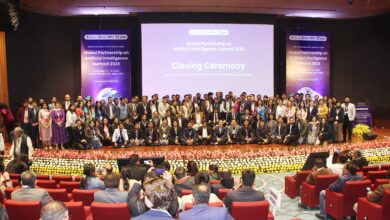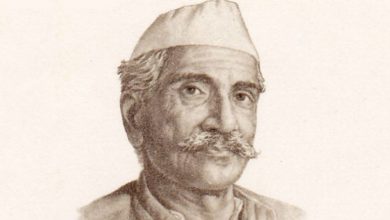जन स्वराज बनाम कॉर्पोरेट राज: 21वीं सदी में विकल्प की खोज
Jan Swaraj VS Corporate Raj : Searching alternatives in the 21st Century
V K Pant | वी के पंत
कॉरपोरेट भूमंडलीकरण के संकट के बीच गांधी का जन स्वराज एक न्यायपूर्ण, विकेन्द्रीकृत और नैतिक विकल्प प्रस्तुत करता है।
21वीं सदी को भूमंडलीकरण का युग कहा गया है—एक ऐसा युग, जहाँ पूंजी, तकनीक और विचार सीमाओं के पार बहते हैं। दुनिया को एक वैश्विक गाँव में बदलने का सपना देखा गया था।
The 21st century has been hailed as the age of globalization—a time when capital, technology, and ideas transcend borders. The world was envisioned as a global village.
लेकिन दो दशक बाद यह सवाल उठता है—क्या भूमंडलीकरण ने सभी के लिए बराबरी के अवसर दिए? क्या इससे लोकतंत्र, न्याय और गरिमा को बल मिला?
But two decades later, the question arises—has globalization truly brought equal opportunities for all? Has it deepened democracy, justice, and dignity?
इन्हीं सवालों के बीच, महात्मा गांधी का ‘जन स्वराज’ आज फिर एक वैकल्पिक और प्रासंगिक विचार बनकर उभरता है।
Amid these questions, Mahatma Gandhi’s “Jan Swaraj” re-emerges as a relevant and visionary alternative.
भूमंडलीकरण के वादे और सच्चाई
भूमंडलीकरण ने समृद्धि, तकनीकी उन्नति, रोजगार और सांस्कृतिक आदान-प्रदान के वादे किए थे। लेकिन इसके साथ-साथ सामने आए असमानता, बेरोजगारी, पर्यावरणीय संकट और सांस्कृतिक क्षरण।
Globalization promised prosperity, technological progress, employment, and cultural exchange. Yet, it also brought inequality, job losses, ecological degradation, and cultural erosion.
अब व्यक्ति ‘नागरिक’ नहीं, ‘उपभोक्ता’ बन चुका है। शिक्षा, स्वास्थ्य और संस्कृति अब बाजार के हवाले हैं।
Today, the individual is seen more as a ‘consumer’ than a ‘citizen’. Education, health, and culture are increasingly subject to market forces.
लोकतंत्र का क्षरण
लोकतंत्र अब केवल चुनावों तक सिमट गया है। नीति निर्धारण में नागरिक की भागीदारी कम हो रही है। राजनैतिक निर्णय अब जनता नहीं, कॉर्पोरेट हित तय करते हैं।
Democracy has shrunk to just elections. Citizens’ participation in policymaking is declining. Political decisions are increasingly influenced by corporate interests.
थॉमस फर्ग्यूसन के अनुसार, अब वही चुनाव जीतता है जिसे पूंजी और मीडिया का समर्थन प्राप्त हो।
According to Thomas Ferguson, electoral success today largely depends on access to capital and corporate-controlled media.
कॉर्पोरेट भूमंडलीकरण की राजनीति
नीतियाँ अब IMF, World Bank और WTO जैसे वैश्विक संस्थानों के निर्देशों से बन रही हैं। स्थानीय जरूरतें हाशिए पर हैं।
Policies are now being shaped by global institutions like the IMF, World Bank, and WTO, sidelining local needs.
शिक्षा, स्वास्थ्य, कृषि और श्रम कानूनों का निजीकरण और कमजोर पड़ना इसी वैश्विक एजेंडे का हिस्सा है।
Privatization and weakening of sectors like education, healthcare, agriculture, and labor rights are part of this global agenda.
गांधी का जन स्वराज: विकल्प का दर्शन
गांधी का जन स्वराज सत्ता के विकेंद्रीकरण, आत्मनिर्भरता, न्यूनतम उपभोग और सामूहिक नैतिकता का दर्शन है।
Gandhi’s Jan Swaraj envisions decentralized power, self-reliance, minimal consumption, and collective ethics.
इसमें गाँव / स्थानीय स्वशासन निकाय अपने निर्णय खुद लेते हैं, संसाधनों का न्यायसंगत उपयोग होता है और जीवन प्रकृति के साथ संतुलन में चलता है।
Villages/ Local Self Governing Bodies make their own decisions, resources are used equitably, and life flows in harmony with nature.
जन स्वराज के पांच प्रमुख तत्व
• विकेन्द्रीकृत शासन
• स्थानीय अर्थव्यवस्था
• सामाजिक न्याय
• उपयुक्त तकनीक
• प्राकृतिक सह-अस्तित्व
Five Pillars of Jan Swaraj:
• Decentralized Governance
• Local Economy
• Social Justice
• Appropriate Technology
• Ecological Coexistence
शहरी नागरिकों की भूमिका
क्या जन स्वराज सिर्फ ग्रामीणों के लिए है? नहीं। शहरी नागरिक भी इस प्रक्रिया में भागीदार बन सकते हैं।
Is Jan Swaraj only for rural communities? No. Urban citizens can be equal participants in this vision.
स्थानीय उत्पादों का उपयोग, नैतिक उपभोग, सामुदायिक भागीदारी और वैकल्पिक जीवनशैली—इनसे भी शहरी भारत जन स्वराज में योगदान दे सकता है।
Buying local, ethical consumption, community engagement, and mindful living—these are ways urban India can embrace Jan Swaraj.
जीवंत प्रयोग और वैश्विक आंदोलन
देश में कई प्रयोग जन स्वराज के आदर्शों को साकार कर रहे हैं:
• एकला चलो आंदोलन (उत्तराखंड)
• नवदान्य (वंदना शिवा)
• स्वराज यूनिवर्सिटी (उदयपुर)
• आनंद ग्राम (गुजरात)
Several initiatives in India are bringing Swaraj to life:
• Ekla Chalo Movement (Uttarakhand)
• Navdanya (Vandana Shiva)
• Swaraj University (Udaipur)
• Anand Gram (Gujarat)
साथ ही स्लो फूड, लोकल इकॉनॉमी, डिग्रोथ और क्लाइमेट जस्टिस जैसे वैश्विक आंदोलनों में भी यही चेतना दिखती है।
Movements like Slow Food, Local Economy, Degrowth, and Climate Justice around the world echo the same values.
समाजवाद बनाम जन स्वराज
समाजवाद राज्य पर आधारित मॉडल था, जबकि गांधी का मॉडल सामुदायिक आत्मनिर्भरता पर आधारित है।
Socialism was a state-centric model, while Gandhi’s Swaraj is rooted in community self-reliance.
जहाँ समाजवाद केंद्रीकरण की ओर झुकता है, जन स्वराज विकेंद्रीकरण, न्याय और नैतिक बल की बात करता है।
Where socialism tends toward centralization, Jan Swaraj emphasizes decentralization, justice, and moral authority.
नेशन स्टेट और जन स्वराज
गांधी ने राष्ट्र-राज्य का विरोध नहीं किया, पर उसे जन-उत्तरदायी और सहभागी बनाना चाहा।
Gandhi did not oppose the nation-state, but he envisioned transforming it into a citizen-driven, participatory system.
पंचायती राज, स्थानीय स्वशासन और नागरिक भागीदारी से यह लक्ष्य प्राप्त हो सकता है।
Panchayati Raj, local governance, and active citizenship can help achieve this vision.
युवाओं और बुद्धिजीवियों के लिए संदेश
आज जब लोकतंत्र, पर्यावरण और संस्कृति संकट में हैं, युवाओं और बुद्धिजीवियों को मौन नहीं रहना चाहिए।
As democracy, environment, and culture face existential threats, youth and intellectuals must not remain silent.
न्याय और विकल्प की चेतना को जगाना, विचार और व्यवहार से जन स्वराज को साकार करना अब आवश्यक है।
It is time to awaken the conscience of justice and actualize Swaraj through both thought and action.
निष्कर्ष: जन स्वराज—भविष्य की आवश्यकता
जन स्वराज कोई अतीत का सपना नहीं, बल्कि वर्तमान संकटों का समाधान है।
Jan Swaraj is not a nostalgic dream, but a solution to present-day crises.
यह 21वीं सदी के लिए एक नैतिक और व्यवहारिक रास्ता है—लोकतांत्रिक, टिकाऊ और मानवीय।
It offers a moral and practical path for the 21st century—democratic, sustainable, and humane.
अंतिम संदेश / Final Message
जन स्वराज केवल एक आंदोलन नहीं—यह चेतना है। यह हमारे अंदर से शुरू होता है।
Jan Swaraj is not just a movement—it’s a consciousness. It begins from within.
Jan Swaraj vs Corporate Raj: The 21st Century Struggle
🎯 1. Core Question
Is global corporate capitalism the only path?
Gandhi’s Jan Swaraj offers a decentralized, ethical, and community-based alternative.
⚖️ 2. Two Contrasting Models
Corporate Raj Jan Swaraj
Decision Power Centralized: Corporates, IMF, WTO Decentralized: Gram Sabhas, local communities
Citizen Identity Consumer Citizen–Participant–Producer
Development Focus Profit, speed, scale Justice, sustainability, self-reliance
Economic Model Global finance, multinational corporations Local economy, small producers, cooperatives
Democracy Electoral spectacle (“Electocracy”) Participatory and ethical democracy
Technology Use For growth and market control Appropriate and context-sensitive
Environmental View Exploitative Coexistence with nature
🌱 3. Five Pillars of Jan Swaraj
1. Decentralized Governance – Power in people’s hands
2. Local Economy – Village self-sufficiency
3. Social Justice – Inclusive participation
4. Appropriate Technology – Human-scale tools
5. Ecological Balance – Living with nature
🔥 4. Crisis under Corporate Globalization
• Widening inequality
• Collapse of rural economy
• Climate emergency
• Cultural homogenization
• Citizen turned into consumer
• Public services privatized
🌍 5. Global Alternatives & Indian Experiments
Global Movements:
• Slow Food
• Degrowth
• Climate Justice
• “Another World is Possible” – WSF
Indian Initiatives:
• Ekla Chalo Movement (Uttarakhand)
• Navdanya (Vandana Shiva)
• Swaraj University (Udaipur)
• Anand Gram (Gujarat)
🏙️ 6. Role of Urban Citizens
• Buy local, eco-friendly products
• Reduce plastic, embrace minimalism
• Join civic platforms, demand participatory governance
• Support ethical education, conscious consumption
🧠 7. Gandhi’s Message for the Future
“Real Swaraj will come not by the acquisition of authority by a few but by the acquisition of the capacity by all to resist authority when it is abused.”
📢 FINAL CALL
Jan Swaraj is not nostalgia—it is necessity.
Let’s reclaim democracy. Let’s localize power.
Let’s choose conscience over consumption.





